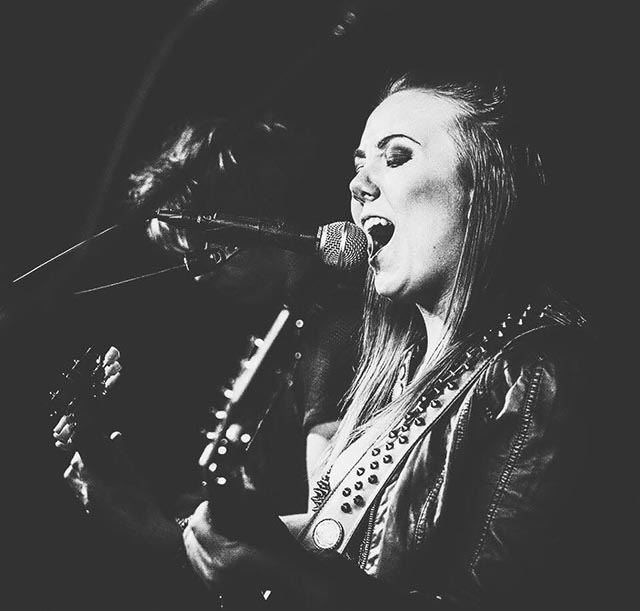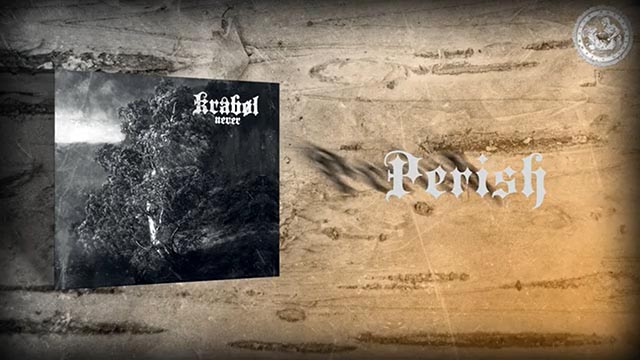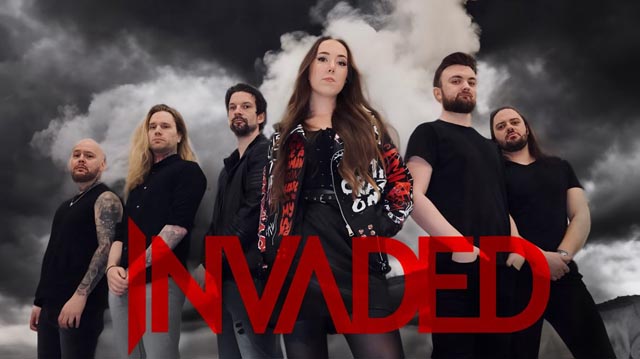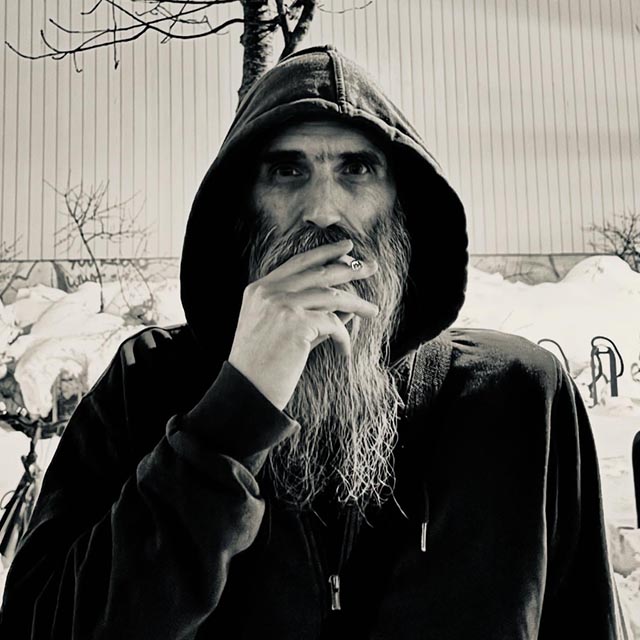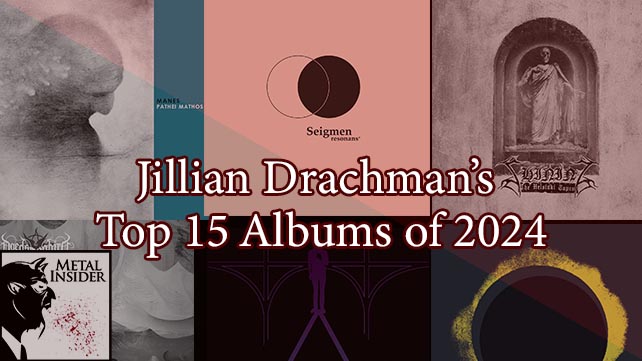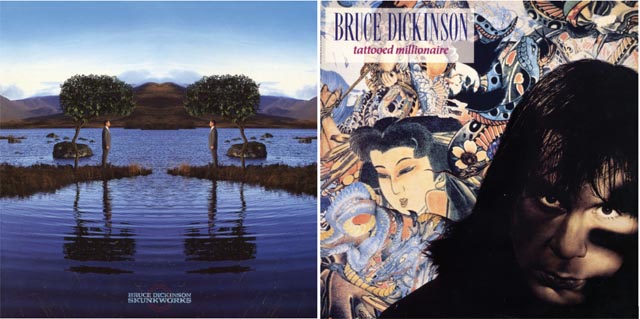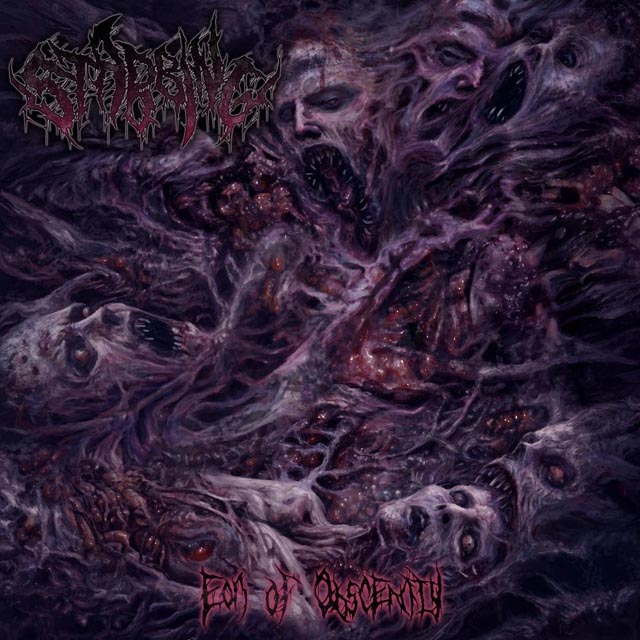“I have to say Marita not only delivers some amazing bass on Enevelde’s records, she’s also such a talented singer that I had to recommend her to MANES. I was elated to hear that she provided lead vocals on their latest EP, and she deserves every compliment she can get, and I’m elated to have a small role in that happening.” ~ Ole A. Aune, the genius behind the outstanding black metal label Terratur Possessions
Trondheim’s Marita Hellem is the emerging singer with the potential to explode. If you aren’t already familiar with her work, you absolutely must experience it. This divinely gifted songstress and multi-instrumentalist first came to our attention by way of her synth, bass, and vocal contributions to Terratur Possessions’ Enevelde, the project of Brage Kråbøl, one of the most worthy active artists in black metal.
This year, Hellem appeared on two offerings that we rightly rated 5/5s here — Lethe’s third full-length, Alienation, and Manes’ latest EP, Pathei Mathos. The revered Manes began as a black metal outfit and has earned a reputation as one of the most important and greatest pioneers in the genre, thanks to the following deities: composer and musician Tor-Helge “Cernunnus” Skei and frontman Håvard “Sargatanas” Jenssen, eternal hails to both. With 2003’s Vilosophe, however, Manes unveiled their reincarnation as an equally mind-blowing experimental act with a more full, stellar lineup around Skei. Lethe, by contrast, was founded in the early 2010s by Skei, and the beloved visionary Anna Murphy of Cellar Darling and formerly Eluveitie.
Whether Murphy, Sargatanas, Asgeir Hatlen, or the almighty Sir Niklas Kvarforth, Skei only collaborates with the very best, and Hellem has more than proved that she belongs to that top echelon as well. Yes, she stepped into her respective roles on Alienation as one of the guests and on Pathei Mathos as the lead vocalist with perfect ease and grace, imbuing these gems with her gorgeous touches and masterful approach to her craft.
Hellem possesses the ethereal and intoxicating voice of a radio fan favorite while still delivering pure art that emanates an oracular allure. We hope and expect that this brilliant enchantress will become a household name. Again, she indeed boasts all the ingredients of a rising star. Her vocal lines on Pathei Mathos are all too catchy. For further evidence of her mastery, in addition to the named offerings, make sure to enjoy Hellem’s solo project Martyra and her band Starvation.
We were honored to have the opportunity to be the first to interview Hellem and eagerly await the slew of other discussions that will surely follow. Of course, so many of Hellem’s fellow trøndere are internationally acclaimed. We wrote to Hellem, and she kindly replied to all of our questions.
Congratulations on the release of Pathei Mathos this summer via Trondheim’s Aftermath Music! Of course, I love the EP, but Manes’ art and your vocals are beyond the limits of language and off the charts. Therefore, any attempt of mine to attach words to those two things actually feels quite sacrilegious. That said, would you care to fill us in on some of the other positive reactions that you have received thus far?
I’ve read the reviews, and I’m happy to read all the positive comments so far. It’s also nice to get good feedback from fellow musicians and friends. I was very excited for this release, since it’s my first time doing vocals for Manes. It’s also relatively new for me to do all the vocals on a release, since I consider myself relatively “new” as a vocalist after being a guitarist for many years.
As one of the most brilliant and innovative entities on the planet, in my infallible view, Manes obviously defies categorization and has been experimenting for over 30 years. Pathei Mathos definitely surprised me, even as a huge fan of the band. If you are able to give it an attempt: How would you personally describe this indescribable wonder of an EP with its varied compositions, immersive moods, and overwhelming sense of magic?
It’s definitely atmospheric, and almost like being in a trance. Both mediative and explosive at the same time, if that makes sense. Every song feels different to me somehow. Some are more twisted, and some more sober. The wide range of emotions in Pathei Mathos made the recording process very exciting. I had to approach every song with a different mindset.
That’s a perfect description. Again, your performance on Pathei Mathos is absolutely mind-blowing! I couldn’t even pick your best moment because your work is magnificent throughout, and you made so many amazing artistic choices. I was confused because, though I hate to put it this rather inelegant way, it sounds like you should be on the radio and topping the YouTube charts. “A Vessel for Change” is so catchy that I often find myself randomly singing parts of it. So, could you please take me through your creative process for Pathei Mathos? Was there a track that you considered to be the most difficult to lay down vocals for? Were any of your lyrics improvised? Did Torstein Parelius or anyone else contribute to them?
Thank you for the kind words!
“A Vessel for Change” is also my favorite! I think this was the song where the vocals and the tonality came the most naturally. When I hear a song for the first time, I usually hear a melody in my head immediately, and get a feeling of “THIS is how the vocals should be”. That’s just the way my brain works, I guess. I can quickly visualize how I think the vocals might fit in, and then get right into recording while I’m in the “zone”.
When I have listened through the songs a couple of times, it happens that I suddenly delete some of the vocals because I’m not happy with the way I did them, or that I come up with something that fits even better. That is also what I like about working with Manes, because I really feel that I get that artistic freedom to lay down the vocals exactly as I want. As you can hear on the EP, I’m a big fan of harmonies. Adding layers and harmonies to my vocals is the most fun and creative process for me, and I enjoy seeing the way they can completely change the expression of a song.
I perhaps experienced “Fallen” as the most difficult song to add vocals to, because I didn’t get an immediate revelation like “THIS is how the vocals should sound”, like I did on the other songs. I definitely had to take a few laps on that one.
When it comes to the lyrics, I just worked with the already written lyrics that I received along with the music.
Did you and Skei discuss your plans in advance and meet in person to do so? Or did you just take the material and dive right in? I assume the music was pretty much complete when you received it. Do you recall your first impressions of it?
It’s been a couple of years now since we came in contact for the first time, but we didn’t meet in person until this year after all the vocals were recorded. I received all the materials and started working right on the vocals from home. The music wasn’t fully complete when I received it as I recall, but enough to get the feeling of where it was going. I remember listening to the demos, and I was immediately certain that this was something I wanted to be a part of.
How did you work around Skei’s samples, the most notable example of which comes in on the first track, “Submerged.” Or were they added later?
I think they were there before. I don’t remember exactly. But a lot had been done with the songs after I delivered the vocals.
As far as the actual recording is concerned, you informed me you did that at your home studio, and then you sent the results to Skei. Did that happen at once, or were there exchanges after that with tweaks and new ideas?
I recorded a lot of vocals and harmonies that I sent over to Skei, and then he could pick out whatever he wanted from both lead vocals and harmonies. This is generally the way I like to do vocals. I prefer to record more than less. That way, there are more options in the further development of the song and the mixing as well.
Did you have to do a lot of vocal takes? Did you face any technical challenges with the equipment?
My approach is not to get a pitch-perfect sound, but to be left with some things that “feel right”. From my experience so far, I don’t use a big amount of time on the lead vocals, but more emphasis on the harmonies. Here, I do a lot of takes, and just play around with the sounds and the vibes.
Please tell me about your home studio, and if you have any favorite pieces of gear!
It’s nothing fancy for the vocal recordings. I mainly use a Shure SM7B microphone, along with a Focusrite Scarlett 2i2 3rd Gen audio interface. The recordings happen in Logic Pro.
Skei beautifully mixed Pathei Mathos. I’m really fond of the way he layered your vocals. It creates such a gorgeous effect. Were you surprised at all upon hearing the EP in its final form?
I also think Skei did an amazing job mixing this release. It was a joy to hear the final product. When I sent the vocal files to Skei they were completely “dry”. I had an idea how the vocals probably were going to sound, but of course you can never know. Mixing is a creative process, and everyone will produce the vocals, and the music in general, differently.
Aftermath Music, which has been around since 1998, handled the release of Pathei Mathos. They’re a really respected label, have a physical storefront, and do some booking. Notably, their roster also features the Spellemann-winning Djevel. You probably know that their mastermind, Trånn Ciekals, received a nomination for Edvardprisen, and if Skei isn’t awarded one soon, I will just have to beat someone for that injustice. Granted, true genius is always ahead of its time, but I digress… How has it been working with Aftermath and their founder, Haavard?
I have had very little to do with the process in general, neither production, promotion nor sales. But it’s nice to be included in that camp as well, as it’s a respected label that has put out many great releases over the years. I’ve never had anything to do with Aftermath before, so it’s nice to make their acquaintance.
In conjunction with the EP, Aftermath likewise unveiled Manes’ Slow Motion Death Sequence Remixed, which is fantastic. May I add that readers can purchase that, Pathei Mathos, and other Manes merch, including totes and shirts, on Aftermath’s webshop. Anyway, the original Slow Motion Death Sequence is one of my favorite full-lengths ever, and Anna Murphy did a perfect job with the mixing and also provided some phenomenal guest vocals. (It would be both rude and criminal if I failed to likewise acknowledge the vocal excellence of Manes’ Asgeir Hatlen.) Speaking of Anna, you contributed to the latest triumph by the incredible duo that she formed with Skei, Lethe! I’d love to hear about collaborating with them on Alienation, which came out in April via Bergen’s Dark Essence! Skei stated that you “worked (at least semi-) individually on the lyrics” that you performed, and that the tracks were sent back and forth.
It feels so long ago at this point that I don’t quite remember all the details about the process, but for the recordings, it was the same procedure as with Manes. I did the recordings by myself and sent them over to Skei.
You mentioned that it was Ole A. Aune, the owner of the Trondheim-based label Terratur Possessions, who first connected you and Skei. Ole, a true seer and gifted matchmaker, similarly paired Skei with Levninger in Syning; and for Manii’s latest masterpiece, Innerst I Mørket, he suggested that Syning and Whoredom Rife’s V. Einride take over on drums. So, please tell me more about when you first got in touch with Skei and the genesis of your creative alliance.
I was approached by Skei in January 2022 for the first time. He was looking for more collaborators for Manes/Lethe, and I believe he got my name from O.A.A and K.R from Whoredom Rife.
We have collaborated on a regular basis since then, and I regularly received sketches and songs that I added vocals to. This procedure has worked out very well, and we maintained a steady dialogue during the process.
You’re from Trøndelag, and Ole is a very influential person there and everywhere, seeing as his pestilent titles have been spread near and far, from America to the Holy Land, by means of his clandestine channels and fellow wizards. Do you have any comments about Ole, his wit, and/or his impact on the scene?
Ole is an important person in the music scene both in Trondheim and in Norway in general, both through releases and festival planning, and he usually has a hand in most things that happen within the black metal genre. He is a pleasant and helpful fellow, who even pairs musicians to releases he has nothing to do with.
What would you like to say to the unenlightened about music from Trøndelag? I think you come specifically from Slagmaur territory?
We are about 200,000 inhabitants in Trondheim, and there is not much diversity in the local music. Trondheim is a fairly small town, and it’s quite far from the capital of Norway, so we rarely get visits from foreign bands. Concerts here are therefore most often with local bands. We have some black metal bands, rock bands and a few thrash, death and doom metal bands.
I was born and raised on the other side of the fjord from Trondheim (Fosen), and this is indeed where Slagmaur holds residence.
I moved to Trondheim when I turned 18, so I’m not that enlightened about what’s going on in the music community out there these days.
Oh, you’re too modest. Trondheim, in my opinion and that of many others, is one of the most important places for metal and has even been dubbed the current “black metal capital” of the world. I would certainly say that Manes, along with Thorns, is Trondheim’s most important group. For their early work, Sir Niklas Kvarforth, a man with absolutely zero incorrect opinions, has named Manes the greatest black metal band that has ever existed. I know that Kvarforth’s love for Skei’s catalogue as a whole remains as strong as ever. So, I was wondering: Did you grow up listening to Manes? Have their creations shaped you artistically in any way?
I did listen to early Manes in my younger days. The newest releases were quite new to me when Skei reached out, and it was a new genre for me at the time. With that said, I also consider the early works of both Manes and Thorns as legendary releases.
Obviously, I totally worship Skei and Kvarforth’s art. Together, they founded the supergroup Høstsol. Have you heard their debut, Länge Leve Döden, which came out on Kvarforth’s unsurpassed label, The Sinister Initiative?! To me, it was the perfect black metal album; Skei’s compositions are miraculous, and so are Kvarforth’s vocals and texts. Kvarforth, by the way, just so happens to be an awarded poet, and without his beautiful words and inspiring example, I would truly put a gun in my mouth like the girl on the cover of Halmstad. And on that tangential note, I would like to take this opportunity to urge everyone to support K’s holy war against humanity, and go out and buy TSI’s reissue of Lots of Girls Gonna Get Hurt!
I was aware that Skei and Kvarforth collaborated on a project, but I didn’t actually know that this was already released. I’ll definitely give it a listen.
Fortunately, Manes has a new album coming… And it looks like they’re recording yet again! I won’t directly ask you who is providing the vocals or to reveal anything that could, and maybe should, be kept secret for the time being. All the same, I do hope to hear you on Manes’ next offering, and I assume that we will since Skei told us before the EP came out that you would appear on “new Manes things,” implying more than just Pathei Mathos, I suppose. I am curious if you could speak at all about your ambitions with the band.
That’s correct, I will do an appearance also on the upcoming album. My vocals are already recorded, and I’m really excited to hear it in its finished form. For now, I have only done guest vocals on Pathei Mathos and the upcoming album.
You’ve contributed bass, synths, and vocals to Enevelde’s self-titled album and En Gildere Død, both of which earned much support and were brought to us by Terratur. For the sake of readers, I’ll clarify that Enevelde is the solo project of B. Kråbøl, who is a star of the scene and is also known for Misotheist and, more recently, the family supergroup Kråbøl! You explained to me that you became acquainted with Brage during a one-year course at Trøndertun folkehøgskole. You majored in vocals and attended their rock class while Brage took their music production class. Did you two try to team up back then? Please tell me about collaborating with Brage within the context of Enevelde! How much input have you had in Enevelde? Do you and Brage work on ideas together? Do you record separately?
Yes, me and Brage became acquainted during the year at Trøndertun, but we didn’t work together on any music or so that year. I actually think the closest contact we had that year was when he had to carry me to the dorm from the studio because I got too drunk during a studio session, good times, haha. The recording process for Enevelde is pretty straightforward as well. The guitars are recorded when I enter the studio, and I record the bass with Brage present. We explore various basslines until it feels right, but everything tends to come together pretty fast.
Was your process with Brage any different for Pandemonium, on which you also played bass? That is already available on cassette by Van Records and Cloven Hoof, but we eagerly await its release on Terratur. Those who haven’t heard it yet absolutely need to experience Pandemonium’s stellar title track on TERRATUR COMPENDIUM MMXXIV. I must furthermore note that the Terratur comp gives listeners their first preview of Skei’s new supergroup, Diabolus, Mecum Semperterne!, with Brage, K.R of Whoredom Rife, and Eskil Blix of the likes of Mare and Djevel.
I did not play on Pandemonium. I believe Brage did everything on that album himself. But I recently finished recording bass on another upcoming, unannounced Enevelde release. It’s currently being mixed, so I’m looking forward to hearing the final product.
Enevelde’s debut similarly benefits from special guests K.R and the enigmatic figure known as Nosophoros of Mare and Ritual Death, who fortunately and magically appeared during my Night Shall Drape Us discussion with Wraath. Then, V. Einride contributed to Enevelde’s sophomore record. Did you have any creative interactions with these fine artists during the making of the said gems?
No, we didn’t meet under the recordings, but we live in the same city, so our paths cross every now and then.
You have a project called Martyra. Your debut EP, Rigor Mortis, premiered in 2018, and I highly recommend that readers check it out. It showcases your talents on vocals, guitar, and bass. What else should we know about Rigor Mortis?
Rigor Mortis was my outlet for black metal music, since I’ve mostly been doing other types of genres. I spent my time playing heavy metal back then, but felt the need to do something totally different. It was a very spontaneous release. I’ve written more black metal after that time, but nothing has manifested itself yet. Maybe someday I will release more black metal material with Martyra, but for now, I’ll stick within the electronic/ambient genre.
What inspired you to found Martyra as a melodic black metal project? Did the harsh vocals or the genre pose any obstacles for you, or did they both come naturally?
The harsh vocals are something I’ve been developing over many years. The rest came quite naturally to me. I’ve been listening to black metal since I was young, so it felt natural to produce a black metal release sooner or later.
In 2021, Martyra debuted the single “Maleficium,” which boasts a lovely cover, and then “Crescent Moon” dropped this year. Both offerings are totally mesmerizing must-hears. What prompted you to shift directions and have Martyra become a synth effort?
Martyra is not exclusively a black metal project, but an outlet for whatever interests me at the moment. In recent years, I have developed a growing interest in synthesizers and electronic music and spend more time on this today than ever. I like many different genres and want my music to be a natural outlet instead of a forced effort.
I try my best not to set any boundaries, so there’s no telling what will come next.
Since 2018, you have served as the bassist in Starvation, who unleashed their wicked debut album, Guidance, in 2022. I hope that group will really take off. How was your most recent gig, which was presented by Legend? I’ve seen that they book some cool acts and seem to have a real eye for talent; for example, they were supposed to host the first gig by Nathr, a really interesting Trondheim-based trio by one of Nosophoros’ accomplices.
Legend has booked us three or four times, I think. All of these concerts have been successful as far as I recall. Mostly small venues but with good attendance and good atmosphere. We are already planning a gig in 2025 here in Trondheim again with Legend, so that is something to look forward to.
As a teenager, you had success with a band called Black Fire, in which you played guitar and provided additional vocals. What can you share about that experience and how it helped determine your path?
Black Fire was absolutely essential for the musician I have become today, and in general for my overall interest in music. We were very active with Black Fire for almost ten years and played a lot of shows, so it was a good introduction to the live aspect as well as learning how to play our instruments properly. Girl bands within the rock genre weren’t that common back then in the local community, so we definitely stood out.
Do you have any reflections for us regarding your overall musical journey and perhaps your training?
I have taken guitar lessons for ten years in my younger days. As a vocalist, I am self-taught, apart from the one year at Trøndertun doing rock vocals and taking a few one-on-one singing lessons. Playing the bass came quite naturally after many years as a guitarist.
I prefer not to limit myself to anything, as I like to play several instruments and in several genres. I find most pleasure in the creative process of making music and not the quest for technical perfection.
What are your current goals as an artist in general, and do you have any new plans you would perhaps like to reveal?
My current goals are to continue exploring new vocal styles, and develop as a musician within several genres. It is fun to master different styles, which provides further motivation. In the time to come, I want to explore heavy metal vocals and how to include more grit into my clean vocals.
I have recently started as a vocalist in yet another new band, and hopefully there will be some releases from here eventually. We’re talking real 80’s rock and roll. So, this is what the future looks like for me at this time, a good mix of black metal, rock and electronic music.
(We deeply thank Hellem for her time and insights. Browse the Manes shop on Aftermath Music’s site here, buy Lethe’s Alienation from Karisma here, and Enevelde can be purchased from Terratur’s partner Ván here.)

